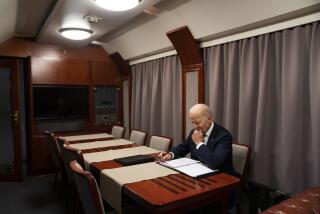AMERICA’S WORLD ROLE: DIVIDED WE STAND : Epilogue : A Willing But Wary Nation Awaits a Mission
- Share via
So Americans aren’t natural-born isolationists after all. Even in a disorderly post-Cold War world, without a Soviet threat to compel their attention, the nation’s leaders and its ordinary citizens want the United States to remain engaged abroad. But they are waiting for someone to offer a convincing rationale--a framework that suggests which fights are worth fighting and why.
The Clinton Administration has not been notably successful in doing that job. Bill Clinton and Warren Christopher are fond of pointing out that it took Harry S. Truman and Dean Acheson two years to come up with “containment”--and they had the Soviet threat to concentrate their minds. But the Berlin Wall collapsed four years ago next week. Even Clinton aides admit that it is past time to come up with a workable new doctrine.
The opinion-makers questioned in the Times Mirror Center poll are divided on many issues, but they agree on one: Strengthening the domestic economy remains the nation’s priority, even in the context of foreign policy. Beyond that, they have a variety of serious and sophisticated concerns: stopping the proliferation of weapons of mass destruction, protecting the global environment, making sure democracy sticks in Russia.
That should sound familiar to Bill Clinton--for it is essentially the foreign policy platform from his own campaign. “In this new era, our first priority in foreign policy and our first domestic priority are one and the same: We must revive our economy,” he said as a candidate in Los Angeles 14 months ago. “We (cannot) withdraw from the world without hurting ourselves. . . . We (must) continue to be engaged and to do things like aid the former Soviet Union in making its transformation to democracy.”
Ten months after he took over the White House, Clinton hasn’t forgotten those priorities, but he has discovered that unforeseen crises--in his case, Somalia, Haiti, Bosnia--demand a President’s attention whether he likes it or not.
Clinton had hoped to spend his time on domestic policy and to leave foreign affairs to Cabinet members. That turned out to be unrealistic, and the President scrambled to reassure the American people that he was on top of things after all. The Times Mirror Center poll shows that they are not yet convinced.
The poll confirms what some of Clinton’s own supporters have recently begun to acknowledge: The President’s foreign policy problems stem partly from failures of political leadership at home--a failure to build a domestic consensus around a new foreign policy; a failure to apply Clinton’s own priorities (economic strength, security, democracy) to the vexing problems of use of force; and, strangest of all, a failure by this most adept of politicians to remember that when the American people send soldiers into battle, they want clear and achievable goals.
The good news for Bill Clinton--and the world--is that there is still a reservoir of willingness in the American people. Even after seeing their countrymen’s bodies defiled in Mogadishu, 56% of the American people still favor using U.S. troops to deliver food to victims of famine in Africa. For all their preoccupation with the domestic economy, about two-thirds of the nation’s opinion leaders still want the United States to shoulder some kind of world leadership.
If Clinton goes back to basics and devotes some of his undeniable talent to the job of molding a new consensus, he may merit that comparison to Truman yet. If he does not, he may find himself condemned to a world that relentlessly serves him one Somalia, Haiti or Bosnia after another.
More to Read
Get the L.A. Times Politics newsletter
Deeply reported insights into legislation, politics and policy from Sacramento, Washington and beyond. In your inbox twice per week.
You may occasionally receive promotional content from the Los Angeles Times.











